April roundup
This is hopefully the last of my roundup posts for a while – after this I hope to go back to the more usual single-book posts. April saw me busy again at work with a closing while at the same time preparing to resign so that I could move on. That meant I focused on books that would help distract me. Here’s my April reading:
Tower, by Ken Bruen and RF Coleman
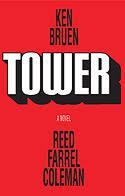
This is a classic cinematic tale of two friends who fall into a life of crime and find themselves on opposite sides. Nick is a hard-bitten hard-drinking Irish-American. His best friend Todd is colder, more calculating, and Jewish. Ethnicity matters in the New York criminal underworld (and in most underworlds for that matter) and while both of them end up working for Irish-American gangster Boyle it’s Nick that becomes Boyle’s favorite.
What follows is a twisted tale that opens with the killing of Boyle’s vicious ex-IRA right-hand man Griffin then backtracks to how everyone got there. We first see Nick’s view on events and then the same events from Todd’s very different perspective. Along the way you see their friendship stretched and tested.
Technically it’s very well done. You can’t see the joins between the two writers and the story rattles along at a hell of a clip. The problem for me was that there’s a thin line between classic and cliché and for me it fell a bit on the wrong side of the divide. Perhaps it’s because I don’t entirely understand this odd romanticising of Irish-Americans that seems so prevalent in the US (though the book to its credit does touch on the point that most of these proud Irish-Americans have never actually been to Ireland).
It’s fast moving, brutal and has solid if broad characterisation. I think a lot of readers would love it but it wasn’t quite me. Guy’s more positive review is here.
Laura, by Vera Caspary
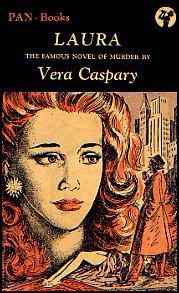
Onto another Guy recommendation, but this time a much better match for me. Laura is an interesting noir tale about a detective investigating the murder of a New York ad executive and well-known party girl. As he does so it becomes apparent that he’s falling in love with her, or at least with his idea of who she was.
There’s a wonderful cast, many of whom get chapters from their point of view. Laura’s best friend, Lydecker, is a fat and rather effete newspaper columnist who prides himself on having taken the small-town girl Laura once was and making her the in-demand socialite she was when she died. He’s a fun character: arch, self-satisfied, prissy but always intelligent. The question is, does he have his own agenda?
The detective, Mark McPherson, is straight from the hardboiled school of fiction. He’s a man’s man, straight-shooting and straight-talking, but he’s the only one in this world who is. Laura’s intended, Shelby, is good looking and ambitious but was he only with Laura for her money? Laura’s aunt, Susan Treadwell, is highly-strung and at first seems fragile but McPherson soon discovers that she’s absolute poison.
Motives multiply and the facts increasingly don’t add up. Laura’s movements on the night of her death don’t make sense and everyone seems to be lying. Just with that this would be a great mystery, but it’s also a great character study as Laura emerges from the confusion as a woman making her own way without children or husband or compromise.
I’ve barely touched on the plot and that’s intentional – while I guessed the ending there was plenty I didn’t guess along the way and if you haven’t seen either of the films (I haven’t) it’s best to come to this unspoiled. Highly recommended.
Guy’s review is here. The cover above isn’t the one I have by the way, I just thought it very good and that it captured the book better than most I saw.
Black Wings has my Angel, by Elliot Chaze
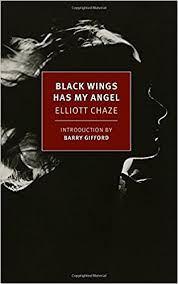
This has got a lot of attention of late due to an NYRB release. I read it as part of a double-ebook edition with Chaze’s One is a Lonely Number, which I slightly preferred to Angel.
That’s not to say that Angel isn’t good. It’s absolutely solid noir with an escaped convict (Tim Sunblade) planning one last big job with a high-class hooker (Virginia) that he met on the road. They’re both deadly and while they may, maybe, come to love each other neither can trust the other an inch.
Chaze does something interesting here in having the whole novel written by Tim Sunblade with the benefit of hindsight. That allows Chaze from time to time to drop in ominous hints which make it quite clear in broad terms what happens to the characters, just not how or why. For most of the book they spend so much energy trying to rip each other off and even trying to kill each other that you start to wonder how anyone will make it to the end.
It’s a truly excellent noir with great characterisation and plotting. I only slightly prefer Lonely as this one depends a little on some bad luck, whereas in Lonely I felt everything that happened came clearly from the character’s choices. Still, that’s a quibble and both are excellent.
Jacqui’s rather good review from JacquiWine’s Blog is here.
Diamond Dogs, Turquoise Days, by Alastair Reynolds
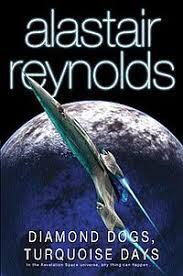
Alastair Reynolds is one of the leading hard SF authors around. I used to be a massive fan but got out of the habit somehow. I picked this one up as it’s actually two separate novellas and shorter than his usual 400-page-plus megatomes (for all I love the genre, SF really does measure books by the yard).
Diamond Dogs is a story about an attempt by a team of mercenaries to explore a strange alien tower on a dead planet. The tower sets increasingly complex mathematical puzzles in each room – solve them and you get to go deeper into the tower; fail and the results are bloody and as time goes on lethal.
As setups go it’s not particularly original and Reynolds plainly knows that, but it is well done. The story is more about obsession and what the various characters are prepared to do to progress, even though the benefits of doing so are unclear at best and increasingly look like they may be non-existent. Here the SF element matters as it allows the mercenaries to adapt themselves as they go further into the tower – replacing lost limbs with cybernetic replacements; augmenting their brains by altering their cognition to boost mathematical ability at the expense of less immediately useful traits. As the story draws to its close it’s questionable whether those remaining are even meaningfully human anymore.
Diamond Dogs reminded me of why I used to like Reynolds so much. It’s solid high-concept SF and led me quickly onto Turqoise Days. Here scholars on a remote planet investigate a Solaris-like ocean/lifeform. Things get literally and figuratively stirred up when for the first time in over a hundred years a spaceship comes from another solar system. The question is, why has the ship come and do its passengers have ulterior motives for visiting such an out-of-the-way colony?
Reynolds tells his story through one particular character who’s lost her higher-achieving sister in an incident on the ocean surface, but who hopes/dreams that her sister may in some sense still be alive as part of the alien organism. Reynolds therefore mixes in issues of sibling rivalry with exploration of alien biomes and again questions of what it means to be human. It’s top stuff, though it’s also again proper hard SF so if you’re not already into the genre I think it would be a tough read.
The Rhesus Chart, by Charles Stross
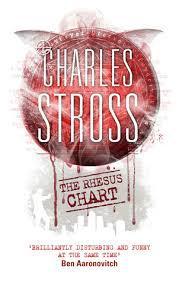
By this point I was mid-closing so I tried another of Stross’s Laundry novels for light relief. This is actually one of the better regarded in the sequence as best I can tell (or at least is seen as a solid entry), but I didn’t hugely enjoy it.
The problem wasn’t so much the book as that I’d read another from the same series literally less than a month before. Stross doesn’t assume the reader has read that previous book so there’s summaries of what happened (which are annoying if you’ve just read it) and the humor is very similar which is fine if spaced out but a bit samey if taken too quickly in succession.
The story here focuses on a team of quantitative analysts who are infected with vampirism and used as tools in an ancient conflict between two much older vampires. It’s better and cleverer than it sounds when summarised like that, but I just shouldn’t have read it so soon after the previous one.
I do plan to continue with the series, but probably not until much later this year or more likely 2019 or so.
Look at Me, by Anita Brookner
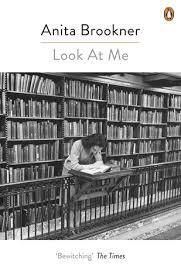
April was arguably my Guy Savage reading month. After the Stross I wanted something a bit more purely literary and thought it time to try one of the Brookner’s Guy’s been recommending of late.
Look at Me is from the 1980s and features a slightly shy young woman Frances who works in a medical library. She falls in with one of the doctors who use the library, the effortlessly charming Nick Fraser, and with his wife Alix.
Nick and Alix are a golden couple and their life is one of endless meals out and high-spirited friends and drama and excitement. Frances, who Nick and Alix immediately start calling Fanny, is too inexperienced to see quite how shallow Nick is or quite how selfish Alix.
Everyone here is well drawn and there are some tremendous set-piece scenes, from an early dinner out with Nick and Alix where Fanny is plunged breathlessly into the dazzle of their lives to much later in the book an absolutely devastating Christmas visit by Fanny to retired librarian Mrs Morpeth. It’s hardly a surprise to discover that Brookner can write, but all the same she definitely can.
I was less persuaded by Fanny as a character, mostly as I just didn’t believe her voice was that of a twenty-something year old. She felt middle aged to me, perhaps slightly older, and while there are good reasons in the book why she is so staid and so quiet it still didn’t quite ring true to me.
Similarly, while Fanny has her challenges it’s made clear that she’s independently wealthy, young, moderately pretty and highly intelligent. That’s not a bad combo to be getting on with, which made me slightly unpersuaded that her options in life were as few as the evidently thinks and thus her need for Nick and Alix as great as it seems.
So, while I respected this and was impressed by the craft, I didn’t love it. It reminded me of so much English literary fiction – a beautifully written account of the lives of highly privileged people who could as easily be living in the 1960s as the 1980s as the 2010s for all the outside world touches them.
For all that criticism, don’t be put off. It’s very well written and there’s an ocean of quiet but deep characterisation here. It’s one of Guy’s favorite Brookner’s and if you’ve any interest in her as a writer is probably worth your time. It’s also fair to say that it’s holding up well in memory – it’s one of those novels that continue to unpack after you’ve read them. Guy’s review is here.
Dark Lies the Island, by Kevin Barry
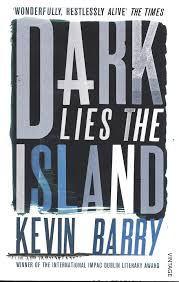
That leaves me with my final read of the month, which is a bit of a cheat as while I finished it in April I’d been reading it off and on for absolutely ages. It’s a Kevin Barry short story collection and it’s hugely impressive both in terms of range and Barry’s command of the form.
The stories here vary from the opener which is a micro-portrait of a young man building up the courage to kiss a girl after a party; to stories of tedious bar-patrons talking endlessly about the best route from one town to another while outside torrential rain threatens to flood the whole place; to a pair of elderly serial killers; to a romance which changes the fate of an IRA bomber; to a petty criminal on the run who decides to hole up with decidedly the wrong people; to, well, much more besides.
Barry is I think one of the better short story writers out there today and this is a top quality collection. The tales often feature elements of the grotesque and are often blackly funny, but Barry’s eye for character and phrase ground them. As soon as I finished it I bought his other collection, Little Kingdoms, because I wanted more Kevin Barry short stories in my life.
And that’s it! May started with Irmgard Keun’s Child of All Nations which was very good indeed. I’m now on China Miéville’s The City and the City (no, I haven’t seen the TV show yet, but just from the trailers the lead in the book now looks like David Morrissey to me. Funny how powerful TV imagery can be).
